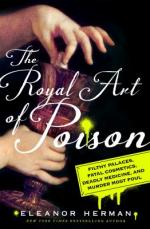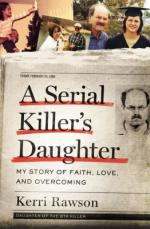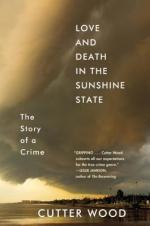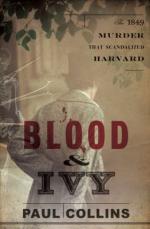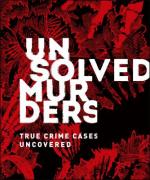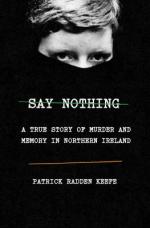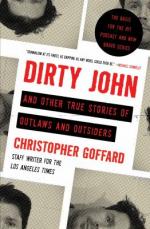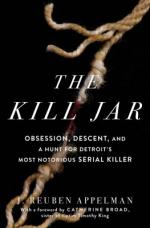March 23, 2019 | kasarak
From podcasts like "My Favorite Murder" to the award winning Showtime miniseries, "Escape at Dannemora," true crime stories are everywhere. The people, motives, emotional fall-out, and ensuing court cases can be fascinating for listeners, watchers, and readers of the genre.
Below are a few of the new true crime books available on library shelves.
The story of poison is the story of power. For centuries, royal families have feared the gut-roiling, vomit-inducing agony of a little something added to their food or wine by an enemy. To avoid poison, they depended on tasters, unicorn horns, and antidotes tested on condemned prisoners. Servants licked the royal family's spoons, tried on their underpants and tested their chamber pots.
Ironically, royals terrified of poison were unknowingly poisoning themselves daily with their cosmetics, medications, and filthy living conditions. Women wore makeup made with mercury and lead. Men rubbed turds on their bald spots. Physicians prescribed mercury enemas, arsenic skin cream, drinks of lead filings, and potions of human fat and skull, fresh from the executioner. The most gorgeous palaces were little better than filthy latrines. Gazing at gorgeous portraits of centuries past, wedon't see what lies beneath the royal robes and the stench of unwashed bodies; the lice feasting on private parts; and worms nesting in the intestines.
In The Royal Art of Poison, Eleanor Herman combines her unique access to royal archives with cutting-edge forensic discoveries to tell the true story of Europe's glittering palaces: one of medical bafflement, poisonous cosmetics, ever-present excrement, festering natural illness, and, sometimes, murder.
What is it like to learn that your ordinary, loving father is a serial killer?
In 2005, Kerri Rawson heard a knock on the door of her apartment. When she opened it, an FBI agent informed her that her father had been arrested for murdering ten people, including two children. It was then that she learned her father was the notorious serial killer known as BTK, a name he'd given himself that described the horrific way he committed his crimes: bind, torture, kill. As news of his capture spread, Wichitacelebrated the end of a thirty-one-year nightmare.
For Kerri Rawson, another was just beginning. She was plunged into a black hole of horror and disbelief. The same man who had been a loving father, a devoted husband, church president, Boy Scout leader, and a public servant had been using their family as a cover for his heinous crimes since before she was born. Everything she had believed about her life had been a lie.
Written with candor and extraordinary courage, A Serial Killer's Daughter is an unflinching exploration of life with one of America's most infamous killers and an astonishing tale of personal and spiritual transformation. For all who suffer from unhealed wounds or the crippling effects of violence, betrayal, and anger, Kerri Rawson's story offers the hope of reclaiming sanity in the midst of madness, rebuilding a life in the shadow of death, and learning to forgive the unforgivable.
When a stolen car is recovered on the Gulf Coast of Florida, it sets off a search for a missing woman, local motel owner Sabine Musil-Buehler. Three men are named persons of interest--her husband, her boyfriend, and the man who stole the car. Then the motel is set on fire; her boyfriend flees the county; and detectives begin digging on the beach of Anna Maria Island.
Author Cutter Wood was a guest at Musil-Buehler's motel as the search for her gained momentum, and he was drawn steadily deeper into the case. Driven by his own need to understand how a relationship could spin to pieces in such a fatal fashion, he began to talk with many of the people living on Anna Maria, and then with the detectives, and finally with the man presumed to be the murderer. But there was only so much that interviews and transcripts could reveal.
In trying to understand how we treat those we love, this book, like Truman Capote's classic In Cold Blood, tells a story that exists outside documentary evidence. Wood carries the investigation of Sabine's murder beyond the facts of the case and into his own life, crafting a tale about the dark conflicts at the heart of every relationship.
On November 23rd of 1849, in the heart of Boston, one of the city's richest men simply vanished. Dr. George Parkman, a Brahmin who owned much of Boston's West End, was last seen that afternoon visiting his alma mater, Harvard Medical School. Police scoured city tenements and the harbor, and offered hefty rewards as leads put the elusive Dr. Parkman at sea or hiding in Manhattan. But one Harvard janitor held a much darker suspicion: that their ruthless benefactor had never left the Medical School building alive.
His shocking discoveries in a chemistry professor's laboratory engulfed America in one of its most infamous trials: The Commonwealth of Massachusetts v. John White Webster. A baffling case of red herrings, grave robbery, and dismemberment--of Harvard's greatest doctors investigating one of their own, for a murder hidden in a building full of cadavers--it became a landmark case in the use of medical forensics and the meaning of reasonable doubt. Paul Collins brings nineteenth-century Boston back to life in vivid detail, weaving together newspaper accounts, letters, journals, court transcripts, and memoirs from this groundbreaking case.
Rich in characters and evocative in atmosphere, Blood & Ivy explores the fatal entanglement of new science and old money in one of America's greatest murder mysteries.
Discover the stories behind 20 of the most infamous unsolved murders of the last century, including the Black Dahlia, the Zodiac Killer, and the JonBenét Ramsey case.
This true crime book lets you judge for yourself, investigating some of the most infamous unsolved cases of the 20th and 21st centuries. It presents crime scenes, crucial evidence, witnesses, and persons of interest along with essential details and clues.
Unsolved Murders also profiles the psychology of the killer, discusses the background and life of the unfortunate victim (or victims), and explores how these horrific crimes impacted the victim's family and friends. Spanning domestic tragedies to serial killers with a love for the macabre, this book will have you up all night.
Unsolved Murders: True Crime Cases Uncovered is like having your favorite true crime podcast or documentary at your fingertips every day.
In December 1972, Jean McConville, a thirty-eight-year-old mother of ten, was dragged from her Belfast home by masked intruders, her children clinging to her legs. They never saw her again. Her abduction was one of the most notorious episodes of the vicious conflict known as The Troubles. Everyone in the neighborhood knew the I.R.A. was responsible. But in a climate of fear and paranoia, no one would speak of it. In 2003, five years after an accord brought an uneasy peace to Northern Ireland, a set of human bones was discovered on a beach. McConville's children knew it was their mother when they were told a blue safety pin was attached to the dress--with so many kids, she had always kept it handy for diapers or ripped clothes.
Patrick Radden Keefe's mesmerizing book on the bitter conflict in Northern Ireland and its aftermath uses the McConville case as a starting point for the tale of a society wracked by a violent guerrilla war, a war whose consequences have never been reckoned with. The brutal violence seared not only people like the McConville children, but also I.R.A. members embittered by a peace that fell far short of the goal of a united Ireland, and left them wondering whether the killings they committed were not justified acts of war, but simple murders. From radical and impetuous I.R.A. terrorists such as Dolours Price, who, when she was barely out of her teens, was already planting bombs in London and targeting informers for execution, to the ferocious I.R.A. mastermind known as The Dark, to the spy games and dirty schemes of the British Army, to Gerry Adams, who negotiated the peace but betrayed his hardcore comrades by denying his I.R.A. past--Say Nothing conjures a world of passion, betrayal, vengeance, and anguish.
Since its release in fall 2017, the "Dirty John" podcast--about a conman who terrorizes a Southern California family--has been downloaded more than 20 million times, and will soon premiere as a scripted drama on Bravo starring Connie Britton and Eric Bana. The story, which also ran as a print series in the Los Angeles Times, wasn't unfamiliar terrain to its writer, Christopher Goffard. Over two decades at newspapers from Florida to California, Goffard has reported probingly on the shadowy, unseen corners of society. This book gathers together for the first time "Dirty John" and the rest of his very best work.
"The $40 Lawyer" provides an inside account of a young public defender's rookie year in the legal trenches. "Framed" offers an unblinking chronicle of suburban mayhem (and is currently being developed by Netflix as a film starring Julia Roberts). A man wrongly imprisoned for rape, train-riding runaways in love, a Syrian mother forced to leave her children in order to save them, a boy who grows up to become a cop as a way of honoring his murdered sister, another boy who struggles with the knowledge that his father is on death row: these stories reveal the complexities of human nature, showing people at both their most courageous and their most flawed.
Goffard shared in the Los Angeles Times' Pulitzer Prize for Public Service in 2011 and has twice been a Pulitzer finalist for feature writing. This collection--a must-read for fans of both true-crime and first-rate narrative nonfiction--underscores his reputation as one of today's most original journalistic voices.
Private investigator Appelman delves into the complex and astonishing case of the Oakland County Child Killer, who is believed to have murdered four children outside of Detroit in 1976 and 1977. Each child was abducted, held captive for days or weeks, then strangled and dumped by the side of the road. The killer was thought to be Charles Busch, who died of a presumed suicide in 1978, but Appelman discovers strange and unaccountable details relating to Busch's death that throw the police version of events into question. His investigation of the child murders and Busch's death leads to a ring of wealthy child molesters and pornographers operating out of a camp on Lake Michigan, and an entire "industry of pedophilia" in the crime-ridden neighborhood of Cass Corridor. It becomes clear, Appelman writes, that the police willfully suppressed evidence related to other potential murder suspects. As Appelman investigates the case, he finds kinship with one of the victims, who reminds him of himself at the same age, a connection that motivates him to work through his own personal demons related to his abusive father and his impending divorce. Appelman's pathos is visceral and cathartic, bordering at times on melodramatic, but his investigative work into this dark, twisted case is remarkably thorough and perceptive.
